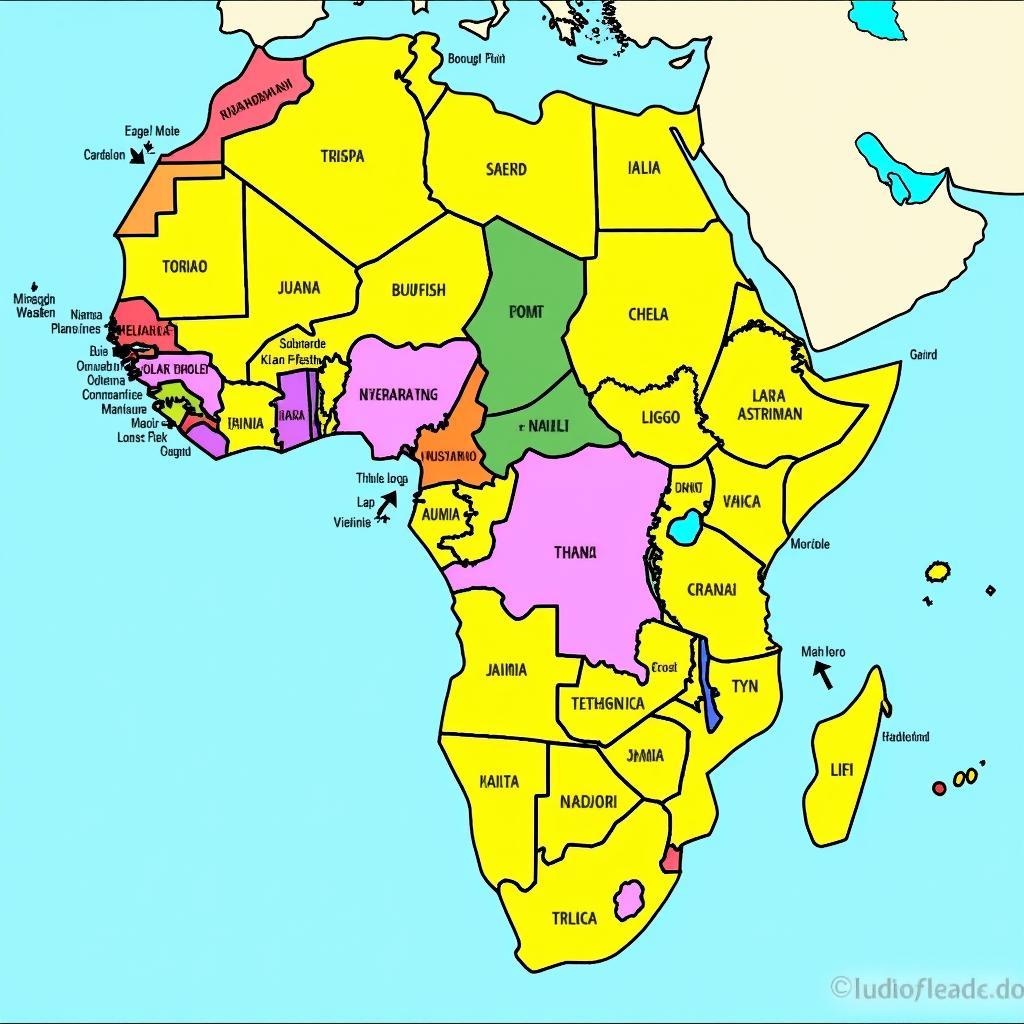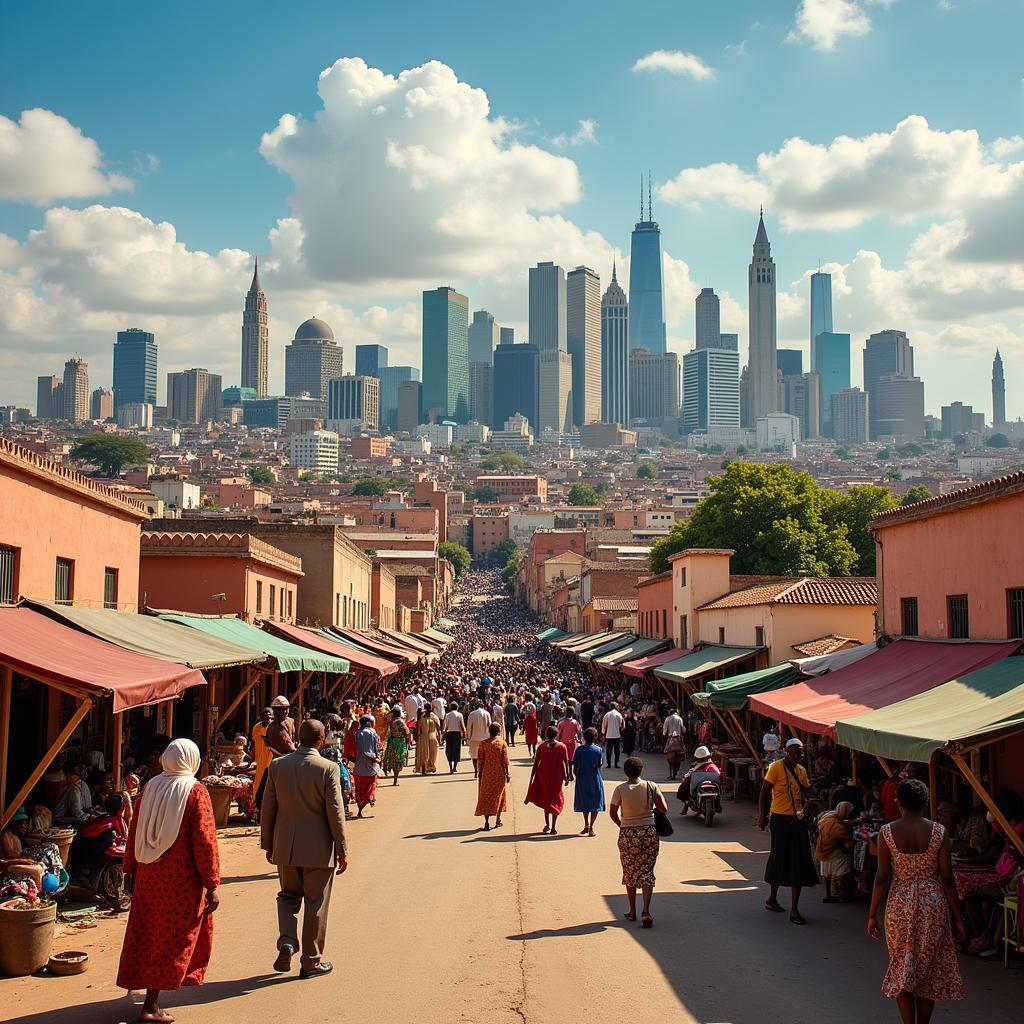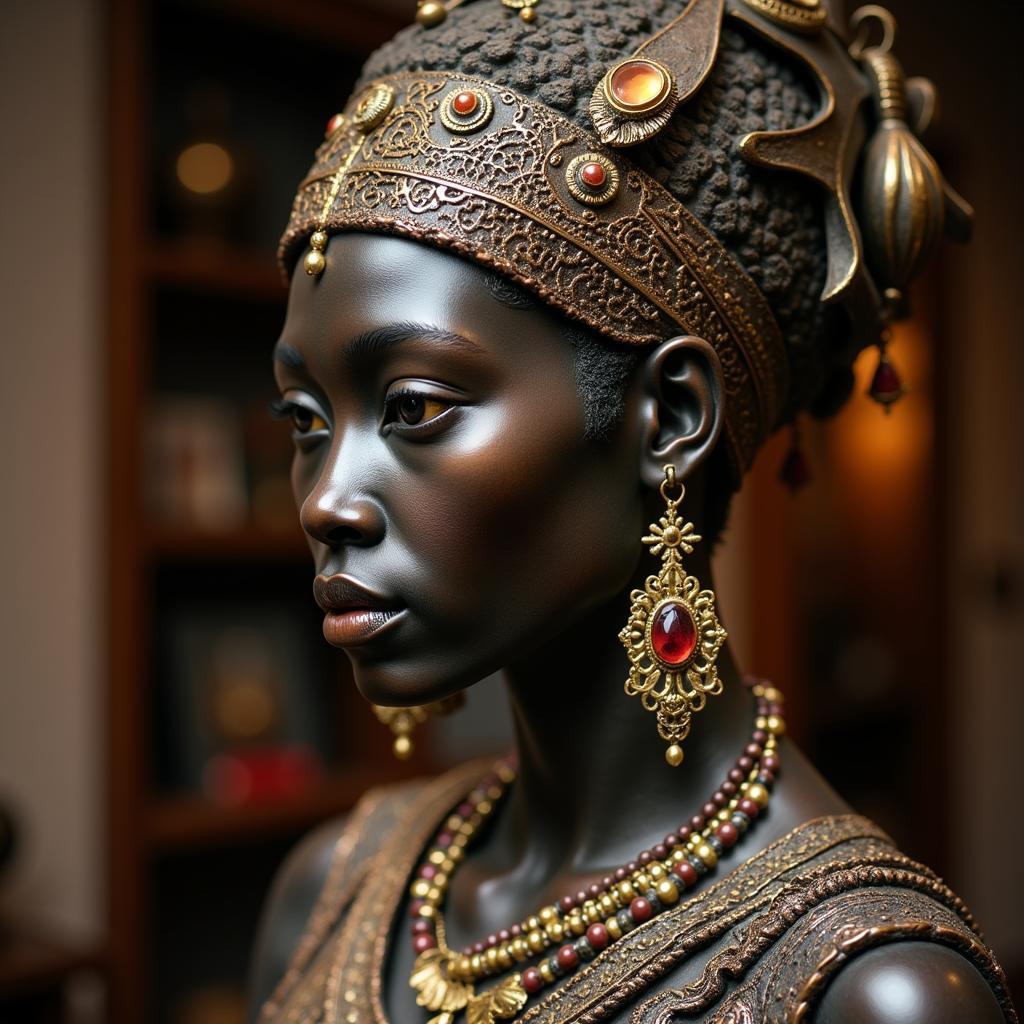African Countries with their Capital Cities: A Comprehensive Guide
Africa, the world’s second-largest and second-most populous continent, is a tapestry of diverse cultures, breathtaking landscapes, and vibrant cities. With 54 recognized sovereign nations, each boasting its unique identity and capital city, navigating the vastness of Africa can be daunting. This guide aims to illuminate your journey, providing a detailed look at African countries and their capitals.
Exploring Africa: A Nation and its Capital
From the bustling medinas of North Africa to the sprawling savannas of the south, each country holds a distinct charm. Let’s delve into the geographic and cultural nuances that define these nations, starting with a comprehensive list:
North Africa
- Algeria: Algiers, the “White City,” graces the Mediterranean coast with its stunning Ottoman architecture.
- Egypt: Cairo, the “City of a Thousand Minarets,” is a captivating blend of ancient wonders and modern marvels.
- Libya: Tripoli, a coastal gem, boasts a rich history evident in its Roman ruins and vibrant markets.
- Morocco: Rabat, the political heart, enchants with its Andalusian gardens and captivating medina.
- Tunisia: Tunis, a melting pot of cultures, offers a glimpse into its Punic, Roman, and Arab past.
East Africa
- Burundi: Gitega, nestled amidst rolling hills, serves as the nation’s administrative center.
- Comoros: Moroni, on the volcanic island of Grande Comore, entices with its scenic beauty.
- Djibouti: Djibouti City, a strategic port city, is a blend of African, Arab, and European influences.
- Eritrea: Asmara, a modernist architectural marvel, showcases its Italian colonial heritage.
- Ethiopia: Addis Ababa, the “New Flower,” is a bustling hub and the diplomatic capital of Africa.
- Kenya: Nairobi, known as the “Green City in the Sun,” is a vibrant metropolis and safari gateway.
- Madagascar: Antananarivo, perched on a high plateau, boasts a rich history and unique biodiversity.
- Malawi: Lilongwe, a burgeoning city, reflects the nation’s agricultural heritage.
- Mauritius: Port Louis, a bustling port city, showcases a blend of French, Indian, and African influences.
- Rwanda: Kigali, a city rising from adversity, offers stunning views and a vibrant cultural scene.
- Seychelles: Victoria, nestled on the island of Mahé, is a tropical paradise renowned for its pristine beaches.
- Somalia: Mogadishu, a city rebuilding itself, is slowly regaining its former glory.
- South Sudan: Juba, on the banks of the White Nile, embodies the aspirations of the world’s newest nation.
- Tanzania: Dodoma, the official capital, shares its prominence with Dar es Salaam, the former capital and major port city.
- Uganda: Kampala, known as the “City of Seven Hills,” is a vibrant hub with a rich history.
Central Africa
- Cameroon: Yaoundé, a sprawling city, is a center for commerce and administration.
- Central African Republic: Bangui, on the banks of the Ubangi River, reflects the nation’s colonial past.
- Chad: N’Djamena, a bustling city, serves as a vital transportation hub.
- Democratic Republic of Congo: Kinshasa, a sprawling metropolis, lies on the banks of the Congo River.
- Republic of the Congo: Brazzaville, a vibrant city, faces Kinshasa across the mighty Congo River.
- Equatorial Guinea: Malabo, on the island of Bioko, boasts a blend of Spanish colonial architecture and modern infrastructure.
- Gabon: Libreville, a port city, showcases a blend of French colonial and modern African influences.
- São Tomé and Príncipe: São Tomé, on the island of São Tomé, is a charming city with a Portuguese colonial heritage.
Southern Africa
- Angola: Luanda, a coastal city, reflects the nation’s oil wealth and Portuguese colonial past.
- Botswana: Gaborone, a modern city, is known for its diamond industry and wildlife reserves.
- Eswatini: Mbabane, nestled in the Mdzimba Mountains, showcases the nation’s rich cultural heritage.
- Lesotho: Maseru, surrounded by towering mountains, offers stunning scenery and a glimpse into Basotho culture.
- Namibia: Windhoek, a modern city, boasts German colonial architecture and a unique blend of cultures.
- South Africa: Pretoria, the administrative capital, shares its status with Cape Town (legislative capital) and Bloemfontein (judicial capital).
- Zambia: Lusaka, a bustling city, serves as a commercial and transportation hub.
- Zimbabwe: Harare, a city of contrasts, offers a blend of colonial architecture, modern buildings, and vibrant markets.
West Africa
- Benin: Porto-Novo, a coastal city, reflects the nation’s colonial past and vibrant culture.
- Burkina Faso: Ouagadougou, known as “Ouaga,” is a bustling city with a rich artistic heritage.
- Cabo Verde: Praia, on the island of Santiago, boasts beautiful beaches and a vibrant culture.
- Côte d’Ivoire: Yamoussoukro, the official capital, shares its prominence with Abidjan, the former capital and major economic hub.
- The Gambia: Banjul, situated on an island at the mouth of the Gambia River, offers a glimpse into the nation’s colonial past.
- Ghana: Accra, a bustling city, showcases a blend of colonial architecture, modern buildings, and vibrant markets.
- Guinea: Conakry, a port city, reflects the nation’s colonial past and struggles for independence.
- Guinea-Bissau: Bissau, a coastal city, boasts a Portuguese colonial heritage and a vibrant cultural scene.
- Liberia: Monrovia, named after U.S. President James Monroe, reflects the nation’s unique history as a haven for freed slaves.
- Mali: Bamako, on the banks of the Niger River, is a bustling city with a rich musical heritage.
- Mauritania: Nouakchott, a coastal city, blends modern infrastructure with traditional Moorish architecture.
- Niger: Niamey, on the banks of the Niger River, showcases a blend of French colonial and modern African influences.
- Nigeria: Abuja, a planned city, reflects the nation’s aspirations for a modern future.
- Senegal: Dakar, a vibrant city, boasts a rich cultural heritage and a strategic location on the Atlantic coast.
- Sierra Leone: Freetown, a coastal city, reflects the nation’s colonial past and struggles with civil war.
- Togo: Lomé, a port city, showcases a blend of German colonial architecture, French influences, and a vibrant African culture.
 Map of Africa with Countries and Capitals
Map of Africa with Countries and Capitals
A Journey Through African Capitals
Each capital city offers a unique perspective on its nation’s history, culture, and aspirations. Here’s a glimpse into the essence of some notable capitals:
- Cairo, Egypt: Home to the Great Pyramids of Giza and the Sphinx, Cairo offers a captivating blend of ancient wonders and modern life.
- Marrakesh, Morocco: Enter a world of vibrant souks, stunning palaces, and the captivating Djemaa el-Fna square, a UNESCO World Heritage site.
- Nairobi, Kenya: Experience the pulse of East Africa in Nairobi, a bustling metropolis with a rich colonial history and vibrant cultural scene.
- Cape Town, South Africa: Nestled beneath the iconic Table Mountain, Cape Town captivates with its natural beauty, rich history, and vibrant culture.
- Accra, Ghana: Experience the warmth of Ghanaian hospitality in Accra, a city blending colonial history, modern infrastructure, and a thriving arts scene.
 Montage of African City Skylines
Montage of African City Skylines
Frequently Asked Questions about African Countries and Capitals
-
Q: What is the smallest country in Africa?
- A: The Seychelles, an archipelago of 115 islands in the Indian Ocean, holds the title of the smallest African country by landmass.
-
Q: Which African country was the first to gain independence?
- A: Ghana, formerly known as the Gold Coast, earned its independence from British rule on March 6, 1957, becoming a beacon of hope for the pan-African movement.
-
Q: What is the largest city in Africa by population?
- A: Lagos, Nigeria, a sprawling metropolis on the Atlantic coast, holds the crown as Africa’s most populous city, with a population exceeding 15 million.
-
Q: Which African country is known as the “Rainbow Nation”?
- A: South Africa, with its eleven official languages and diverse population, earned the moniker “Rainbow Nation” to symbolize its post-apartheid unity in diversity.
-
Q: Which African country is home to Mount Kilimanjaro, the highest peak in Africa?
- A: Tanzania, a country renowned for its wildlife reserves and stunning landscapes, is home to Mount Kilimanjaro, a dormant volcano and a dream destination for adventurers.
Need More Information?
For personalized assistance in planning your African adventure, contact us:
Phone: +255768904061
Email: kaka.mag@gmail.com
Address: Mbarali DC Mawindi, Kangaga, Tanzania
Our dedicated team is available 24/7 to answer your questions and provide expert guidance.


